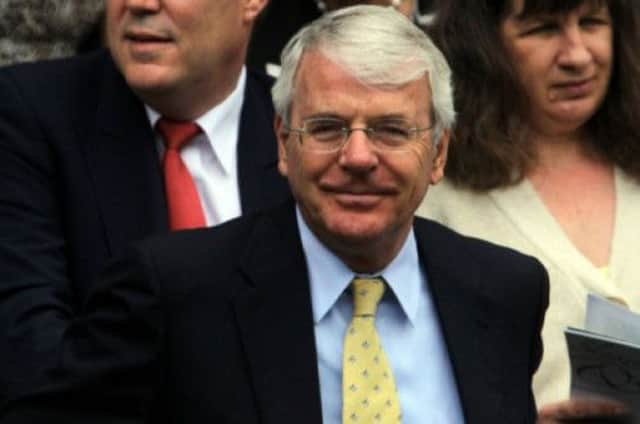Euan McColm: Judge politicians on what they do


It was shocking that power in Britain was overwhelmingly held by the privately educated and the affluent middle classes, and an outrage that people were abandoned when social mobility was lost.
What made these jabs so intriguing was that they came not from some socialist firebrand but from a former Conservative prime minister. It was hard not to read Sir John Major’s speech last week at the South Norfolk Conservative Association as a personal attack on Eton-educated PM David Cameron and his coterie of privileged chums.
Advertisement
Hide AdAdvertisement
Hide AdRichard Bacon MP, who hosted the dinner, later said that Sir John’s remarks were aimed at the previous Labour government which had done much to damage social mobility. But didn’t the former PM’s words bring to mind that famous photograph of a youthful Cameron, alongside George Osborne, Boris Johnson, and their fellow members of Oxford University’s Bullingdon Club, a private dining society where insufferable youths gathered to bray at waiting staff?
And if one had somehow missed that image along the way, Sir John’s assertion was re-enforced, days later, by photographs of Cameron, in white tie, at the Lord Mayor’s dinner, where he spoke of the importance – and, potentially, the long-term nature – of austerity measures, while standing beside a woman sitting on a golden throne.
Of course, Sir John hit on an evident truth: the higher reaches of our government are currently (and have been frequently in the past) populated by people from privileged backgrounds. The former Conservative leader (he left school with three O-levels, you know, and he did ever so well for himself) was our most recent working-class prime minister.
His successor Tony Blair was distinctly middle class, while Gordon Brown was excused from the tiresome class structure on the basis that he was raised a son-of-the-manse.
But, while he correctly identified that there are toffs at the top, Sir John offered little in the way of advice on how more people from less affluent backgrounds might progress in politics or business. His intervention seemed to boil down to the expression of the far from uncommon view that privilege is unfair. Let me, then, stand in defence of that most vulnerable of creatures, the wealthy, posho politician.
While Sir John is surely right to say more people from poorer backgrounds in power would be a good and representative thing, the idea that a privileged background should somehow be held against a politician is a quite ludicrous one. Being born into wealth is just as much an accident of birth as is being born into poverty. We should judge politicians on where they are and what they stand for, not on from where they’ve come.
Sir John’s analysis applies, it must be said, to those at the top of the pile in UK terms. Here, in Scotland, there is far less evidence of the privileged being disproportionately successful in politics. First Minister Alex Salmond is no toff, though – as the son of two civil servants – nor did he have to pull himself up from the bottom of the pile. Scottish Labour leader Johann Lamont had a more conventionally working-class background, growing up as the daughter of a joiner in Glasgow’s Anderston district.
We do have some gilt-edged poshoes at Holyrood but, this being Scotland where we don’t like that sort of thing, they tend to keep quiet about it. Labour’s Claudia Beamish is entitled, as the daughter of Tufton Victor Hamilton Beamish, Baron Chelwood, to prefix her name with “the honourable”.
Advertisement
Hide AdAdvertisement
Hide AdShe doesn’t do so and gets very cross indeed with anyone who chooses to raise her privileged background. This, unsurprisingly, is as good a reason as any for SNP MSPs to do just that.
Holyrood’s poshest MSP has now retired but Conservative Lord James Douglas-Hamilton was the toff that even the most fervent left-winger could do business with. Members of the Scottish Socialist Party, elected to progress the revolution in 2003, found themselves infuriatingly charmed by him. He was, they complained, so damned reasonable and helpful. A fine moment in Holyrood’s brief history was the afternoon when Lord James and Green Party MSP Patrick Harvie spoke in favour of gay adoption in the face of some deeply conservative comments from the SNP benches.
Lord James – Baron Selkirk of Douglas, if you prefer – may not have stood as evidence that those from privileged backgrounds are automatically suited to political life but nor did his record support the case against poshoes in parliament.
Nobody is likely to disagree with Sir John’s desire that people should be allowed to “fly as high as their luck, their ability and their sheer hard graft can actually take them”.
The Conservative Education Secretary Michael Gove started life in care and was adopted by a Labour supporting family in Aberdeen, then educated at a state comprehensive before winning a scholarship that saw him finish his schooling privately. He would appear to have done exactly what Sir John fears is now impossible. And others will follow.
Politics has always been a difficult game to get into. It’s time consuming, with endless campaigning that often ends in defeat. It’s hardly a surprise, then, that it’s more accessible to the better-off.
Changing that is a matter for all political parties (perhaps by guaranteeing a wage for candidates) but the rest of us should care about the motives and abilities of those we elect rather than whether they grew up in a mansion or a single end. «
Twitter: @euanmccolm